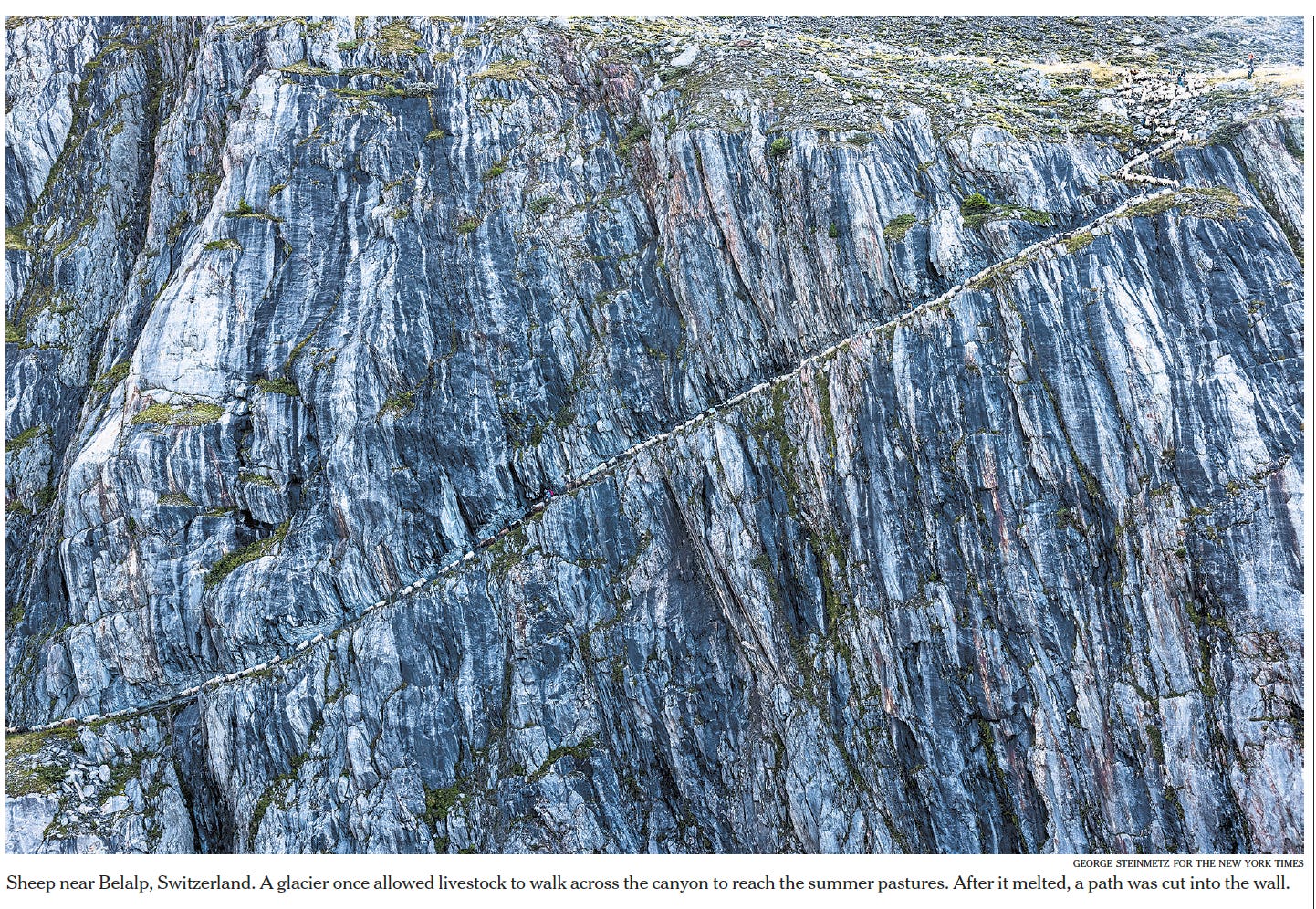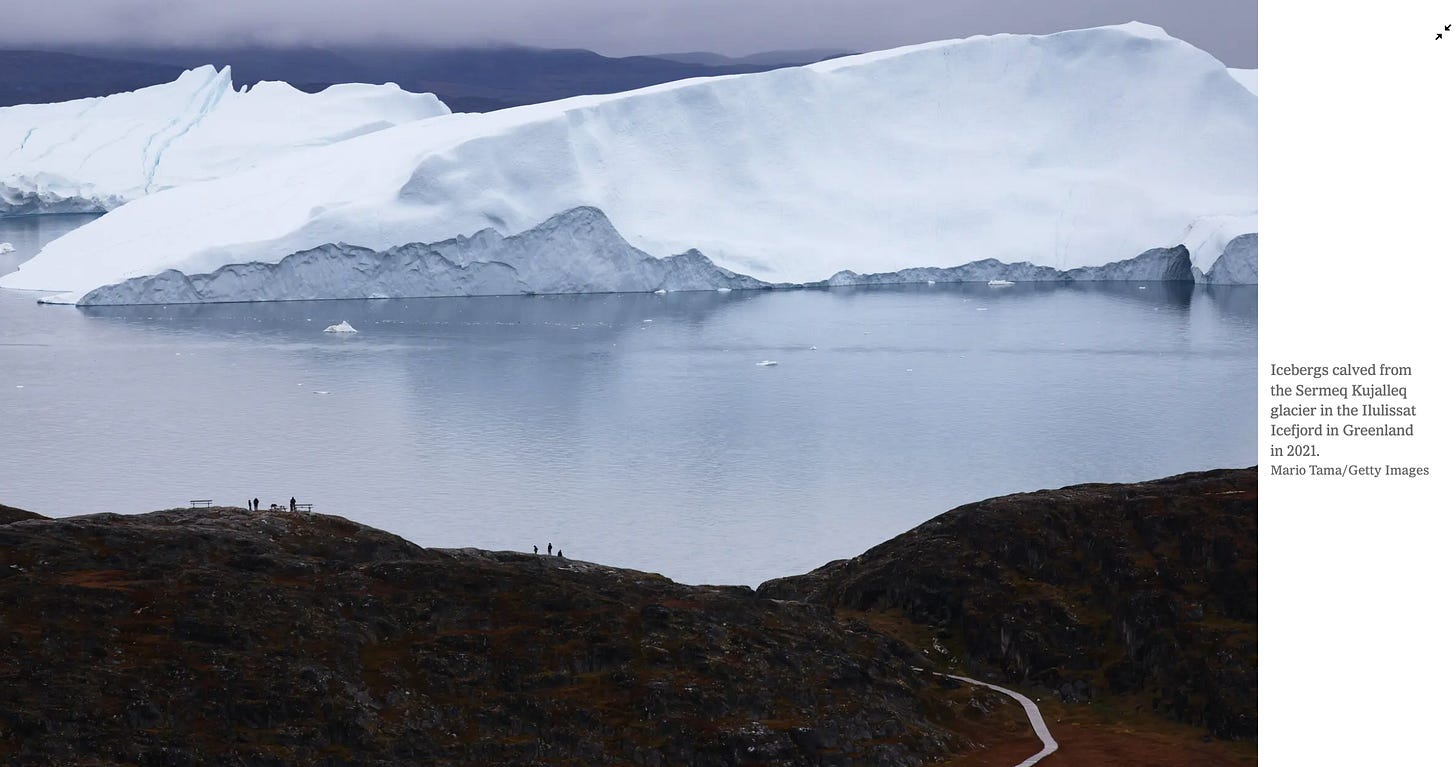Years ago, I successfully hoodwinked a substantial group of 19- to 21-year-olds. I have never forgotten how it felt.
We were in a tour bus lined with tall windows. The seats were firm and comfortable, and many of us were hanging onto the backs of the seats ahead—because the bus was wheeling adeptly through the Alpine heights between Italy and Switzerland. We were members of a college chorus on a summer tour. My Crawford grandmother, a generous person who herself loved to travel, had paid my way for the trip.
The sunny scene was impossibly idyllic: Steep, bright grassy slopes below us, iron-grey mountains above us wreathed with snow, and the bluest sky. I felt lucky and mischievous. I pointed to some sheep chewing on the vertiginous green hillside. "They're so clever, the farmers," I said. "They breed sheep to be stable on particular slopes—there are left-sided sheep, with longer legs on their right sides, and right-sided sheep, with long left legs. They point them in the right direction from birth and they don’t fall over." It was improbable, but the people around me believed me. Surely, in this neat and well-planned European world of tall buses and clean streets, bespoke sheep were possible. I nodded gravely and held back from either smiling or making up more details.
I have rarely in the decades since fooled anybody about anything, so this event has stuck in my mind—a joyous Wodehousian moment for me.
I thought of this again today when I read on the front page of the New York Times that Alpine farmers are having to adapt to rapid climate change. Sheep are front and center:
Those are sheep creeping up a path carved for them into the side of a hill because the glacier they used to walk over is gone. Here is what should be the central motivating sentence of this article:
In the past two years alone, Swiss glaciers have lost 10 percent of their water volume — as much as melted in the three decades from 1960 to 1990.
That is extraordinarily fast. That is an unthinkable, uncanny rate of loss. Here's another line about rate of loss, in a story describing the fraying margins of Greenland's ice sheet:
[A] new study reveals that about 20 percent more of the Greenland ice sheet has disappeared than previous estimates show.
Scientists used to think that Greenland had lost about five trillion metric tons of ice since 1992. But now we know that it's actually six million metric tons. A trillion tons more. "That amount is roughly equivalent to an ice cube covering an area larger than Manhattan and taller than Mount Everest, according to the European Space Agency." The earth is losing more than a trillion tons of ice every year. Things are definitely speeding up: "The rate at which Earth has lost ice has increased markedly within the past three decades."
Scientists watch polar ice carefully because that's where most of the sea level rise we face will come from. Ninety-eight percent of the 212 feet of potential rise is housed in ice at the poles. Ice melt is speeding up.
We have about twenty years to plan and implement adaptation efforts for 10,000 global coastal cities before chronic, debilitating inundation moots our ability to plan. Across those twenty years, leaders will need to set the stage for ongoing, continuous change in the face of rapid sea level rise.
Let's call this the Great Transition, just to have a name for what's needed.
I'm lucky to spend a lot of time with younger minds. They're flexible and imaginative, and they can believe, with real energy, that rapid climate change will happen. Like the people in my past who heard about the right-legged sheep, they can accept the uncanny. This time, though, the improbable fact ("lots of water is coming quickly") is true.
We see in many climate arenas that young minds are capable of astounding feats in service of their concerns. But young minds have trouble understanding that twenty years is very little time when it comes to planning ahead. They cannot imagine themselves or the world twenty years from now, because they've only been around that long themselves. It's impossible.
That's where older minds, minds more my age, have the advantage. I know that I have just twenty or thirty years (if I am lucky) to live, and I am comfortable with planning right now to make them meaningful. I know the next decades will fly by for nations and cities, just as they will for me.
For the Great Transition, we need leaders who can combine the urgency and flexibility of young minds—and their ability to believe the improbable—with the time-awareness and navigational savvy of older minds.
The Great Transition will go on forever. But we should not wait to begin, because (unlike my invented right-legged sheep), the changes are real and happening now.







Typo alert:
"Scientists used to think that Greenland had lost about five trillion metric tons of ice since 1992. But now we know that it's actually six million metric tons."
I think you meant 6 TRILLION tons.
Older mind here. Doing everything I can to live lighter on the Earth. Let's live on the planet as if we intend to stay...
Yes the Grest Transition is here and we must adapt while also doubling down on restoring carbon, nitrogen and water cycles. Here’s another Wodehousian tale. The Greenland icesheet melt is measured by satellites with “surface truthing” by scientists on the ice sheet. Massive amounts of ice-melt water puddles in windows rows across the icesheet covering much of Greenland. So much water that it would cover Callifornia, if CA were flat, with 4 feet of water. Minor detail, 4 CA’s and 2 NHs could fit into Greenland. With all that melt water, it is not known if more or less than 50% will refreeze come September. The ice sheet is 60 miles from the coast. With warmer summers plants are photosynthesizing more. The long and short of it is that not much freshwater is observed reaching the ocean. I swam in the ocean in a Greenland harbor and the surface water tasted 36 parts per thousand, like the Atlantic Ocean, less than the Mediterranean(40 ppm) and more than the Gulf of Maine. With more energy going into the ocean water warms and expands, is less dense than cold water, and that is why sea levels rise, combined with more stormwater run off from the land. Deepen soils around your home to hold more water and there’ll be less sea levels rise, by as much as 25% less. Nevermind Greenland. Act locally when thinking globally, and don’t blame others when there is more to be done in concert with others.